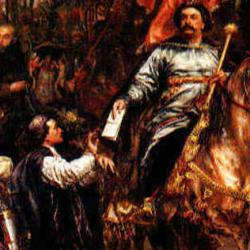In a 2010 article in The Other Shore, Rice University’s Ewa Thompson argues that post-colonial categories are useful for explaining the experience of formerly Soviet-occupied areas of Eastern Europe, especially Poland. Many Poles, she admits, associate imperialism with European imperialism in Africa and link orientalism with the far east. Thompson differs. She thinks that a post-colonial analysis of Poland would enable Poles to work through some of their current challenges, especially vis a vis Europe.
Thompson writes, “it can hardly be denied that the partitions of Poland in the eighteenth century and occupation of Poland by Soviet Russia after the Second World War were forms of colonialism; that is to say, they included a violent conquest and subsequent efforts to exploit and reeducate the locals who differed from the conquerors linguistically, religiously, and politically. It is a thesis of this paper that colonialism is not necessarily grounded in racism; it can also be grounded in nationalism, with Russia being a prominent example.”
She admits that the methods of Soviet colonization were different from the methods of Western European powers in the southern hemisphere, but she finds the notion of subaltern developed by Homi Bhabha is applicable to Poland. Bhabha and other post-colonial theorists have argued that “the elite of conquered countries are subjected to colonizing pressures to a greater degree than the remainder of the population, and they yield to these pressures faster than the rest because their privileged position in society hinges on such submission. The social class that collaborates with the conqueror is always recruited from the elite that existed before the conquest.”
During the late 18th century, when Poland was partitioned and disappeared from the map of Europe, the land-owning and military elites were replaced by intelligentsia elites. She posits that “it is easier to subjugate the intelligentsia-based elite than those whose material base is ownership of the land or proven valor and military skills. Such was the case during the Soviet occupation of Poland in 1945-1989. Portions of the intelligentsia collaborated with the colonial occupier, and then took steps to make society forget about it; this sequence of events did not favorably predispose it toward a postcolonial interpretation of its actions. Nor has the formerly pro-Soviet intelligentsia been favorably disposed toward an interpretation of postwar Polish history that has as its central thesis the statement that Poland was a colony of Soviet Russia.”
The Soviet Union was feared but not respected, even by the elites who cooperated with them. Rather than honor the real hegemon, Polish intellectuals tended to offer homage to a surrogate hegemon, the intellectual leadership of the West, which involves a corresponding sense of inferiority among Polish thinkers: “In Polish intellectual life one finds frequent mention of books and periodicals published abroad, as well as expressions of respect toward those who conducted their Eastern-Europe-oriented political activity abroad. These people became authorities for those living in Poland. Out of this practice there emerged a view that Western countries are a model to follow in every way, that one travels westward to enjoy liberty and well-being, and to learn how to interpret history and the present. . . . While under the circumstances some of this reverence was justified, in the long run it ceded to foreigners the right to interpret the world and society, including Polish society. This shift was grounded in an awareness that Western societies had at their disposal not only military strength, but also intellectual prowess that dominated the world and represented it in categories articulated by German, French, and English thinkers. However, acceptance of the intellectual primacy of France, Germany, Great Britain, or the United States inscribed a sense of ‘being worse,’ or at least being less developed intellectually, into the consciousness of the Polish elite, thus confirming the hegemon’s narrative about the primacy of metropolis over periphery.”
Thompson points to the common practice of publishing foreign writers in the Polish press: “these commentators know little of Polish history and political traditions and they usually do not know Polish, yet they are listened to with great attention. Their resumes contain references to internationally prestigious universities, publishing houses, and periodicals, and that is enough for Polish audiences to treat them with utmost seriousness. In contrast, the commentaries delivered by local scholars who spent their entire professional careers studying the society in which they live are often treated with less respect. Foreign intellectuals are aware of that, and they use to the full their hosts’ permission to theorize about Poland and other smaller or weaker states of Central and Eastern Europe. This readiness to theorize Others is particularly visible in Germany. In contrast, Polish scholars are seldom asked to comment, let alone theorize, on German social and political problems.”
Thompson identifies these “invocations of the authority of a substitute hegemon” as acts of submission” that “duplicate the act of surrendering to the colonizer and his superior power. They confirm the colonialist essentializations: civilization-barbarism, Enlightenment-the Dark Ages, intelligentsia-rednecks, superior-inferior, better-worse.” And she argues that Poland needs to shake this colonized habit of mind in order to face its future: “Unless Poles perceive themselves as the formerly colonized subalterns who have presently achieved the status of an independent nation, they will have difficulties arguing themselves into the European discourse constructed without their participation or input.”











